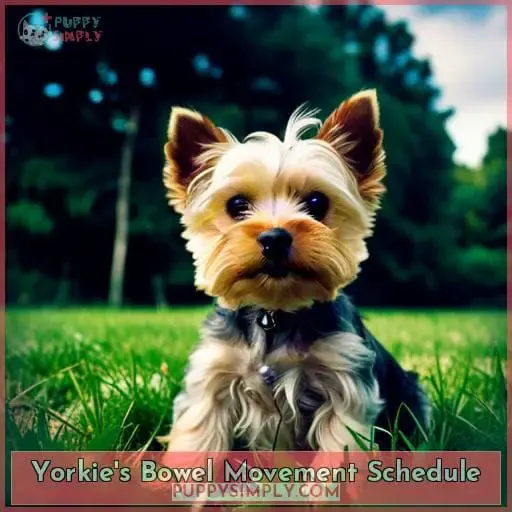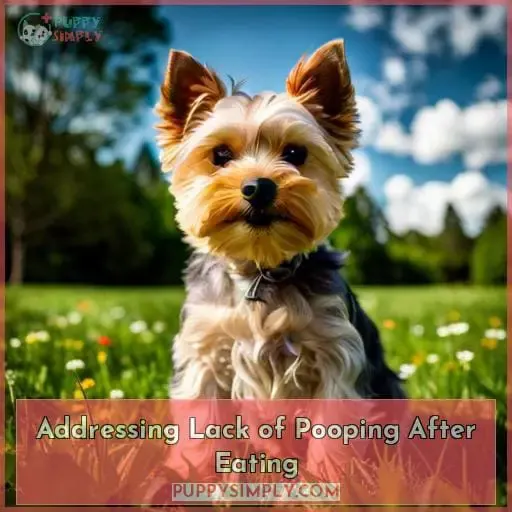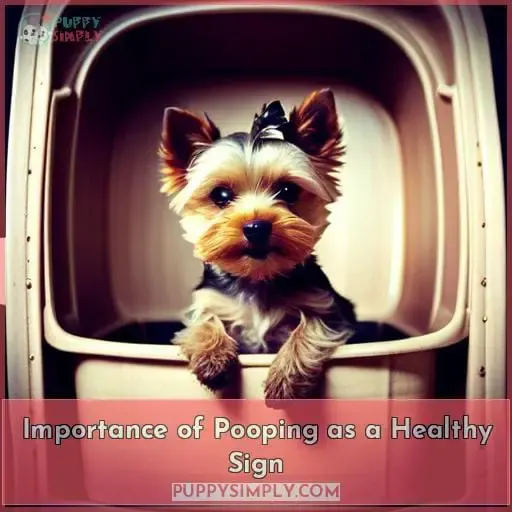This site is supported by our readers. We may earn a commission, at no cost to you, if you purchase through links.
 After your Yorkie finishes eating, they’ll need to take care of business outside.
After your Yorkie finishes eating, they’ll need to take care of business outside.
But how long do you have before it’s time for them to poop?
Well, typically, Yorkies will need to relieve themselves within 45 minutes after eating.
Of course, every dog is different and some may go sooner or later than that timeframe.
So keep an eye out for their signals and be ready with the leash when nature calls!
Table Of Contents
Key Takeaways
- Give Yorkies time to sniff around and find a suitable spot.
- Avoid forcing or rushing them to go.
- Consistency, patience, rewards, and praise are key in potty training.
- Monitor for changes in Yorkies’ bathroom habits.
Yorkie’s Bowel Movement Schedule
Understanding your Yorkie’s bowel movement schedule is vital for effective care.
Yorkies typically need to relieve themselves within 30 to 45 minutes after a meal, but individual variations exist. Learning their specific signals and patterns ensures you’re attentive to their needs, facilitating a smoother potty routine and preventing accidents.
Individual Variations
Your Yorkie’s bowel movement schedule varies based on individual needs and signals.
Variability management is essential in understanding their unique mealtime dynamics, digestive differences, and behavioral idiosyncrasies.
Timeframe flexibility allows you to anticipate their bathroom needs while considering health concerns and nutritional requirements.
By observing your Yorkshire Terrier’s behavior and adjusting accordingly, you can ensure their comfort, well-being, and establish a routine that suits them best.
Learning Your Yorkie’s Signals
To effectively learn your Yorkie’s signals and establish their bowel movement schedule, observe their behavior closely.
Pay attention to behavior cues and potty signals that indicate they need to go.
Recognizing the timing patterns will help you anticipate when they might need to relieve themselves.
Stay alert for signs such as restlessness or sniffing around, which may signal the need for a bathroom break.
Learning your Yorkie’s signals is crucial in preventing accidents and addressing any potential health issues or behavioral causes like separation anxiety.
Establishing a Routine
To establish a routine for your Yorkie’s bathroom habits, consistency is key. Observing their bowel movement schedule helps plan outings effectively, ensuring they go outside after every meal. This routine not only saves time but also minimizes the chances of accidents, keeping your Yorkie comfortable and well-trained.
Consistency is Key
Ensure your Yorkie maintains a consistent routine to establish healthy bathroom habits after meals.
Consider:
- Digestion process
- Meal size
- Post-meal activity
Age factors influence timing.
Consistency aids gastrointestinal health and minimizes coprophagia risks.
Going Outside After Every Meal
After each meal, promptly take your Yorkie outside to establish a consistent routine for bathroom breaks.
- Potty Training
- Outdoor Exploration
- Digestive Health
- Post-Meal Activities
- Mealtime Bonding
Remember to use high-quality dog food recommended by veterinarians.
Planning Outings Accordingly
Plan your outings with your Yorkie accordingly to establish a routine. Consider the following:
- Frequency of outings
- Activity planning
- Time management
Incorporate mealtime strategies and post-eating activities like training commands.
| Outing Frequency | Activity Planning |
|---|---|
| Consistent schedule | Engaging exercises |
| Regular potty breaks | Mental stimulation |
Table: Factors for Planning Outings Accordingly
Timeframe for Letting Your Yorkie Out After Eating
After your Yorkie finishes a meal, it’s beneficial to allow 15-20 minutes before taking them out. This timeframe encourages exploration and readiness, letting them prepare for their bathroom needs without rushing the process.
By gradually introducing this routine, you can better understand their schedule and minimize accidents while keeping your Yorkie comfortable and stress-free.
Allowing Exploration and Preparation
Don’t rush the process; let them explore and prepare before they decide to relieve themselves.
Here’s what you should do after your Yorkie finishes their meal:
- Give them time to sniff around and find a suitable spot.
- Wait patiently for them to feel comfortable enough to go.
- Avoid forcing or rushing them, as it may lead to accidents indoors.
- Remember, allowing your Yorkie the freedom to go at their own pace promotes a positive potty training experience while ensuring their safety and well-being.
Starting With 15-20 Minutes After Meals
To ensure your Yorkie has enough time to explore and prepare, let them outside 15-20 minutes after meals. This timeframe allows for digestion and gives your furry friend the opportunity to find a suitable spot.
It’s important to consider changes in diet, environmental factors, dehydration, regular exercise, and a fiber-rich diet when determining their bathroom routine. Taking these factors into account will help maintain their overall health and well-being.
Addressing Lack of Pooping After Eating
If your Yorkie isn’t pooping after eating, there are a few possible reasons to consider.
- Temporary constipation can occur when changes in diet disrupt their digestive system, so give them a few days to adjust.
- Environmental stresses or changes in routine may also affect their bowel movements.
- Additionally, make sure your Yorkie stays hydrated by encouraging fluid intake.
- Consult with a vet if you have concerns about their lack of pooping after eating.
Temporary Constipation and Diet Changes
If your Yorkie is experiencing temporary constipation after eating, it may be due to diet changes.
Changes in their dietary fiber content can affect their poop schedule variations, causing a delay in pooping.
Ensure they’ve proper hydration and monitor for normal poop color, consistency, and frequency.
Environmental Stresses and Changes
When your Yorkie experiences environmental stresses or changes, it can affect their pooping habits.
- Changes in routine
- Change in shelter
- New home, new pet, travel
Dehydration and Fluid Intake
Dehydration can cause constipation, so make sure your Yorkie is drinking plenty of fluids.
Offer them water after meals and throughout the day to stay hydrated and avoid constipation.
Importance of Pooping as a Healthy Sign
Pooping is a healthy sign that your Yorkie’s digestive system is functioning properly.
Facilitate their bathroom needs by encouraging outdoor time after meals.
This routine helps in establishing a predictable schedule for potty training and monitoring for any changes in their bathroom habits.
Facilitating Bathroom Needs
Pooping is a healthy sign.
Facilitate their bathroom needs by:
- Taking them outside after meals.
- Letting them explore.
- Encouraging regular exercise and fluid intake.
Establishing a Predictable Schedule
Pooping is a healthy sign that your Yorkie’s digestive system is functioning properly.
Here are 3 tips for establishing a predictable schedule:
- Consistency
- Patience
- Rewards & praise
Monitoring for Changes in Bathroom Habits
Once you understand their schedule, you can monitor for any changes in their bathroom habits, such as:
- Changes in poop color, odor, consistency, frequency, volume
- Straining to poop
- Blood in poop
How Often Should Dogs Poop?
Knowing how often dogs should poop is important for their overall health and well-being.
Most adult dogs typically poop once a day, while puppies may need to go as much as five times a day.
Factors such as age, diet, exercise levels, and individual variations can affect the frequency of bowel movements in dogs.
Average Frequency of Pooping
To better understand how long after eating Yorkies poop, it’s important to know the average frequency at which dogs should poop.
- Most adult dogs poop once a day on average.
- Some dogs may go two or three times per day.
- Puppies may need to go as much as five times a day.
Understanding your dog’s normal pooping habits can help you identify any changes in their bathroom routine, such as diarrhea or straining.
Factors Affecting Poop Frequency
While most adult dogs poop once a day on average, factors like diet, exercise, and age can affect poop frequency.
A balanced diet plays a crucial role in maintaining regular bowel movements.
Adequate exercise stimulates the digestive system and promotes healthy digestion.
Age also plays a part; puppies may need to go more frequently while senior dogs may defecate less often.
Certain medications or health conditions can also impact poop frequency.
When to Seek Veterinary Advice
If you notice persistent issues with your Yorkie’s bathroom habits, such as:
- Constipation
- Changes in poop consistency
It may be time to seek veterinary advice.
Changes in their pooping habits can sometimes indicate underlying health concerns that require professional attention.
Remember to monitor any changes closely and consult a veterinarian if you have concerns about your Yorkie’s digestive health.
Persistent Issues and Underlying Causes
If your Yorkie is experiencing persistent issues with their bowel movements or if you notice any changes in their poop consistency, it’s important to seek veterinary advice. These issues could be a sign of underlying conditions such as impacted bowels or chronic constipation.
A vet consultation can help determine the cause through fecal analysis and provide appropriate treatment, which may include medication, dietary changes, or probiotics.
Changes in Poop Consistency and Habits
If you notice any changes in your Yorkie’s poop consistency or habits, it’s important to seek veterinary advice.
Normal poop for a Yorkie should be firm and well-formed. Any drastic changes in color, odor, frequency, or consistency may indicate underlying health issues.
Black or tarry stools could suggest bleeding in the digestive tract while loose stools might signal an infection.
Frequently Asked Questions (FAQs)
What are the signs that my Yorkie needs to poop?
When your Yorkie needs to poop, they may exhibit signals like:
- Restlessness
- Circling
- Sniffing the ground
Pay attention to their body language and learn their unique cues for a timely bathroom break.
What should I do if my Yorkie is constipated?
If your Yorkie is constipated, there are a few steps you can take:
- Increase their water intake.
- Incorporate fiber-rich foods into their diet.
- Regular exercise also helps promote healthy digestion.
If the issue persists, consult a veterinarian for further guidance and treatment options.
What are the benefits of a fiber-rich diet for Yorkies?
A fiber-rich diet offers numerous benefits for Yorkies.
It promotes healthy digestion, regulates bowel movements, and prevents constipation.
Additionally, it aids in nutrient absorption and can help maintain a healthy weight.
Providing proper nutrition is essential for your Yorkie’s overall well-being.
How can I encourage my Yorkie to drink more water?
To encourage your Yorkie to drink more water, try using:
- A clean and fresh water bowl that’s easily accessible.
- You can also add flavor by using chicken or beef broth.
- Providing multiple water sources throughout the house may also help increase their intake.
What are the signs of a serious health condition in Yorkies?
Signs of a serious health condition in Yorkies include:
- Sudden changes in appetite
- Weight loss
- Lethargy
- Vomiting or diarrhea lasting more than 24 hours
- Difficulty breathing or urinating
Prompt veterinary attention is essential for proper diagnosis and treatment.
Conclusion
Knowing how long after eating your Yorkie will need to poop can help you establish a routine and make sure they’re able to relieve themselves comfortably.
Keep an eye out for their signals and be prepared to take them outside when they need to go!













